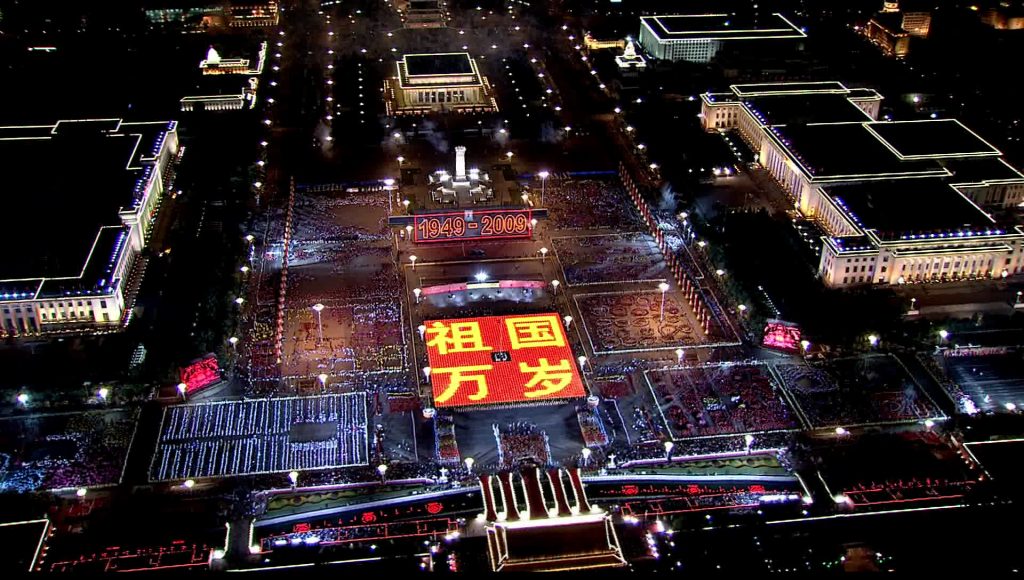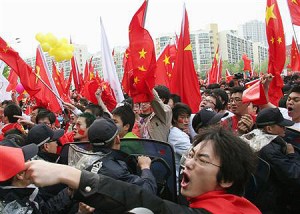Chinese Nationalism (民族主义) Posted by Stephen on Oct 2, 2011 in Culture
 As we celebrate National Day (国庆节) in China, it seems like a an apt time to reflect upon Chinese nationalism or 民族主义 (mín zú zhǔ yì). China is one of the most patriotic nations I’ve lived in (with an exception of the United States) and as a result, nationalism is rampant.
As we celebrate National Day (国庆节) in China, it seems like a an apt time to reflect upon Chinese nationalism or 民族主义 (mín zú zhǔ yì). China is one of the most patriotic nations I’ve lived in (with an exception of the United States) and as a result, nationalism is rampant.
Just read the newspaper headlines out of China. Maybe it’s a Chinese troller captain that was picked up by Japanese coast guards, maybe it’s refusal to allow the Dhali Lama’s presence into mainland or maybe it’s just a bunch of people getting together to reflect on the direction that China is heading in–nationalism is a way of life in China.
The breakdown of the word “nationalism” in Chinese divides into: 民族 or “ethnic group” and 主义 or “philosophy/creed/belief” or just simply “ism”. Chinese nationalist roots come from two dominant, yet different sphere’s of influence: Confucianism or 孔教(Kǒng jiào) and Patriotism 爱国主义 (ài guó zhǔ yì)-literally translated as “love country-ism”.
While Confucian roots are ancient, they still heavily influence modern lifestyles. After all, the legacy of thousands of years of philosophy (on par with Greek and Roman culture) is pretty hard to forget. Within Confucian “proto-nationalism” a person is defined by the structure of their community and the five (5) cardinal virtues relating a person to their family (filial piety including relation to mother, father and siblings), and those relating to your community and your superiors. Now this may not sound very nationalistic, but when you consider how it defines your role in society, the structure of your place within and your duty to that society, then a nationalist credo emerges. After all, nationalism is the adherence to a community, whether it is “folk based” (cultural) or “imagined” (societal).
While this “imagined” sense of nationalism is strengthened in a modern China, it doesn’t quite explain why China is so fervently patriotic. In fact, since the Cultural Revolution, the Chinese people have been united under the banner of economic prosperity. As a result, “economic nationalism” has supplanted most communist and Maoist ideology, redefining the role between citizen and government. It’s not surprising that Beijing leadership looks maintain “harmonious and sustainable growth”–a clever way of saying 8% or higher GDP growth, while combating inflation and fighting employment. In the words of Billy Clinton: “it’s the economy, stupid!”
While nationalism can be guided and directed by the Chinese government to suit specific goals, it can also grow into an uncontrollable entity that constrains leadership and even threatens authority (much like the events in the Middle East and North Africa). People take to the streets because they have a vested interest in their nation, but what happens when it’s a population of 1.3 billion? Talk about power to the people.
Chinese citizens want to see their country grow great again, and once again be the “center nation” (中国) to which all other countries look to as a model. The way they do this is a blend of economic nationalism tinted with “neo-confucian” sensibilities.
If you are interested in learning the “March of the Volunteers” which is the official Chinese National Anthem, check out the video below:
Here are the lyrics:
起来!不愿做奴隶的人们!
把我们的血肉,筑成我们新的长城!
中华民族到了最危险的时候,
每个人被迫着发出最后的吼声。
起来!起来!起来!
我们万众一心,
冒着敌人的炮火,前进!
冒着敌人的炮火,前进!
前进!前进!进!
Pinyin:
Qǐlái! Búyuàn zuò núlì de rénmen!
Bǎ wǒmen de xuèròu, zhùchéng wǒmen xīn de chángchéng!
Zhōnghuá mínzú dàoliǎo zuì wēixiǎn de shíhòu.
Měi ge rén bèi pòzhe fāchū zuìhòu de hǒushēng.
Qǐlái! Qǐlái! Qǐlái!
Wǒmen wànzhòngyìxīn,
Màozhe dírén de pàohuǒ, qiánjìn!
Màozhe dírén de pàohuǒ, qiánjìn!
Qiánjìn! Qiánjìn! Jìn!
Happy National Day everyone!
Follow Steve on Twitter: @seeitbelieveit

Build vocabulary, practice pronunciation, and more with Transparent Language Online. Available anytime, anywhere, on any device.
About the Author: Stephen
Writer and blogger for all things China related. Follow me on twitter: @seeitbelieveit -- My Background: Fluent Mandarin speaker with 3+ years working, living, studying and teaching throughout the mainland. Student of Kung Fu and avid photographer and documentarian.





Comments:
Robina:
here’s something about Nationalism in 21st century china: http://thinkingchinese.com/index.php?page_id=318
thanks for the simple and enlightening post!